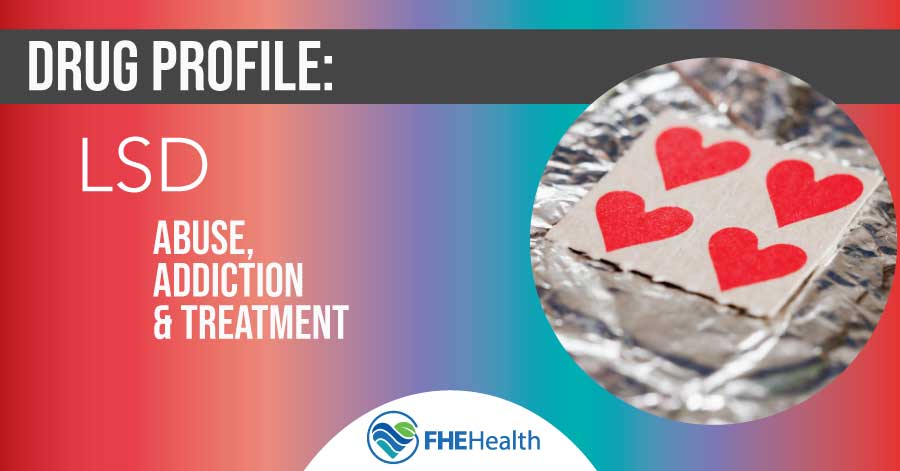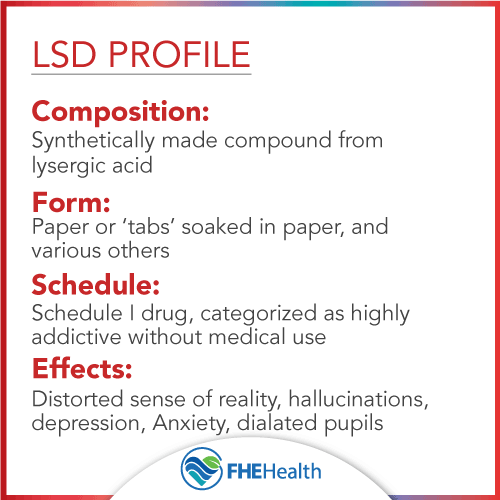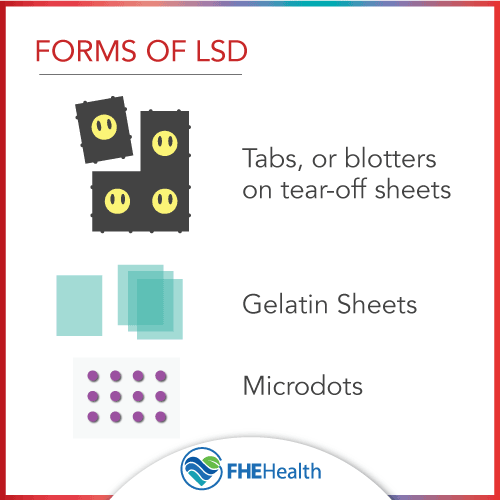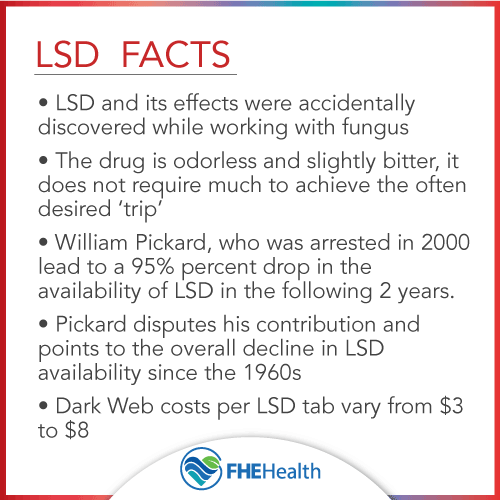
First developed in 1938 by Albert Hofmann, LSD, or “lysergic acid diethylamide,” was first discovered while Hofmann was working with a fungus. Hofmann experimented with doses and experienced the world’s first intentional “acid trip.” In the 1950’s LSD acid was used as part of the CIA’s MK-Ultra project. Today, LSD is a Schedule I Controlled Substance, as defined by the Federal Controlled Substance Act of 1970.
Ken Kesey, the author of One Flew Over the Cuckoo’s Nest, was a big fan and promoter of LSD drug use in the 1960’s. He routinely hosted “drug parties” that were attended by the Grateful Dead and other bands centered around psychedelic culture. A religion called “League for Spiritual Discovery” even emerged from growing LSD drug use.
What is LSD Acid?
 Considered a “classic hallucinogen,” LSD is synthetically made from lysergic acid, naturally found in ergot which is a fungus that grows on grains. LSD is so potent that doses are measured in micrograms. LSD is first produced in a crystalline form and later mixed with inactive ingredients for consumption, or it is diluted into a liquid form for ingestion. LSD acid is an odorless acid drug that tastes slightly bitter.
Considered a “classic hallucinogen,” LSD is synthetically made from lysergic acid, naturally found in ergot which is a fungus that grows on grains. LSD is so potent that doses are measured in micrograms. LSD is first produced in a crystalline form and later mixed with inactive ingredients for consumption, or it is diluted into a liquid form for ingestion. LSD acid is an odorless acid drug that tastes slightly bitter.
LSD is available on the streets in various forms such as:
- Soaked acid drug paper, which is the most common form
- Window panes, which are thin squares of gelatin
- Sugar cubes doused with liquid LSD
- Tablets, often called microdots
- Pure liquid
Also known as “acid,” “LSD acid,” “blotter,” “doses,” “dots,” “trips,” “mellow yellow,” “window pane,” LSD acid is sold under more than 80 common street names.
Where is LSD Made?
Since the arrest of William Pickard in 2000, there has been much speculation about where LSD is produced in the US. Pickard was convicted in one of history’s largest LSD-manufacturing cases, and is currently serving two life sentences for his role in the drug’s production. Currently, LSD appears to be manufactured in small labs on the Pacific coast of the US and in Southern Ontario, Canada.
What Is LSD Used For?
 Although LSD acid was used in medical experimentation in the early to mid 1900’s, it is not considered to have an accepted medical use in the United States and is considered an unsafe drug, even under medical supervision. LSD acid is a mind-altering, hallucinogenic drug and its effects occur as a result of how it interacts with your brain’s serotonin receptors. (Serotonin is a brain neurotransmitter that regulates mood and senses.)
Although LSD acid was used in medical experimentation in the early to mid 1900’s, it is not considered to have an accepted medical use in the United States and is considered an unsafe drug, even under medical supervision. LSD acid is a mind-altering, hallucinogenic drug and its effects occur as a result of how it interacts with your brain’s serotonin receptors. (Serotonin is a brain neurotransmitter that regulates mood and senses.)
Your reaction to LSD can vary, and whether you will experience a “good trip” or a “bad trip” is completely unpredictable. Experiencing extreme changes in mood is typical, and LSD is known to result in delusional behavior and visual hallucinations. Those who self-medicate with LSD experience the following effects within 45 minutes of ingesting the acid drug:
- a distorted sense of reality, including perception of shapes and colors
- altered sounds
- hallucinations
- depression
- anxiety
- increased heart rate, resulting in higher than normal body temperature and high blood pressure
- changes in perception of time
- dilated pupils
- risk of “flashbacks” which occur days or months later
LSD is not considered to be a physically addictive drug, because its use does not result in the same uncontrollable drug-seeking behavior associated with other highly addictive drugs, like opioids. LSD acid does result in a tolerance to other drugs that are considered highly addictive, such as PCP. Since LSD acid is illegal and unregulated, use of the acid drug in any dose amount is considered to be drug abuse.
Compared to most other drugs, LSD leaves the system rather quickly. Factors such as age, food intake, and overall metabolism may cause variations in the length of time that LSD remains in your system. Generally, LSD acid can be detected in your urine for eight hours, in your blood for 12 hours, and in your hair for 90 days. (Although a widespread belief circulated during the 1970s that LSD remains in your spine indefinitely, a 1989 study with mice disproved that notion.)
What Is LSD Addiction?
 Although LSD acid is not considered to be a physically addictive drug, people can become addicted to the experience of “tripping” and the hallucinogenic experiences that result from ingesting acid. In this sense, LSD abuse can result in psychological dependence and physical tolerance, which together can add up to addiction and present serious health dangers. Prolonged use may result in dangerous paranoia and psychosis, for example.
Although LSD acid is not considered to be a physically addictive drug, people can become addicted to the experience of “tripping” and the hallucinogenic experiences that result from ingesting acid. In this sense, LSD abuse can result in psychological dependence and physical tolerance, which together can add up to addiction and present serious health dangers. Prolonged use may result in dangerous paranoia and psychosis, for example.
Classified as a Schedule I drug, LSD is among the most criminalized drugs, and is considered to have a “high potential for abuse.” The National Institute on Drug Abuse reports that LSD use is on the rise among high school children in the US. There is no accepted medical use for LSD, partly due to the profound changes it causes to neurotransmitters in the brain. Users of LSD acid find that they must dramatically increase their dose to achieve the same level of “trip.” Progressively increasing your dose of LSD increases the chances of long-term damage and experiencing a “bad trip.”
If you or your loved one is abusing LSD, you may notice some or all of the following common signs:
- Excessive salivation or dry mouth
- Weakness
- Dilated pupils
- Inability to perform complex tasks
- Emotional distress or paranoia
- Sweating or chills
A single LSD trip may last 12 hours or even longer. When you have consumed LSD, you become less concerned with concealing the drug’s effects, which are typically noticeable to others.
Although there have been no conclusive LSD acid overdoses reported, accidents and deaths result from LSD use. A lack of awareness and disregard of caution can easily result in injury while you are experiencing an LSD trip. Additionally, a “bad trip” can result in a severe panic attack, fear of imminent death, and fear of insanity. The severe disorientation that results from the use of LSD can cause violent tendencies that can result in homicide or suicide.
LSD Addiction Treatment
The majority of people abusing LSD are under 21 years of age. Thousands of LSD users seek treatment every year because they want to move on from a life of escapism. The psychological addiction that occurs with LSD consumption can lead users to take hundreds of “LSD trips.”
When you seek LSD addiction treatment, you might begin treatment with a detox process that flushes out stored drug toxins that may be present in fatty tissue, depending on your personal needs. Once your body is relieved of these toxins, you will begin to think more clearly and experience fewer flashbacks in both the short and long term. Treatment for LSD use can successfully relieve long-term psychosis caused by abuse of the drug.
If you or a loved one suspect your use of LSD acid and lifestyle surrounding the use is becoming detrimental to your health and life, don’t be afraid to reach out for help. Contact an FHE addiction counselor today, by calling us at (833) 596-3502 Our compassionate team of counselors is standing by to take your call 24/7. Start your journey to recovery today.






